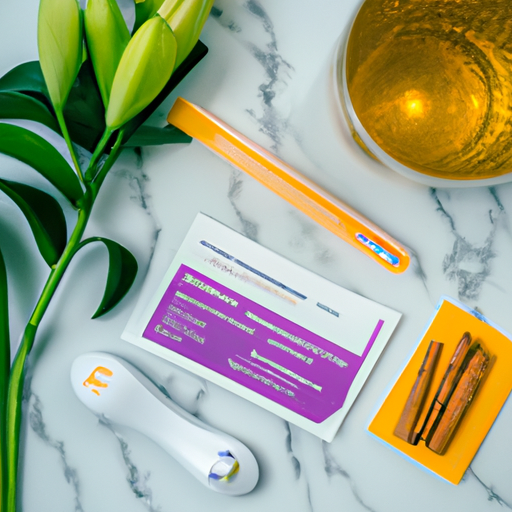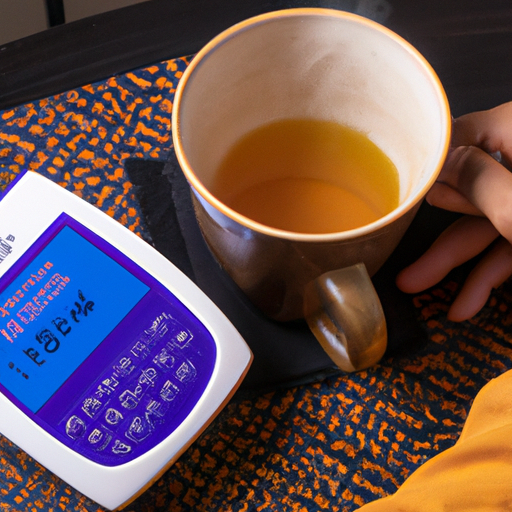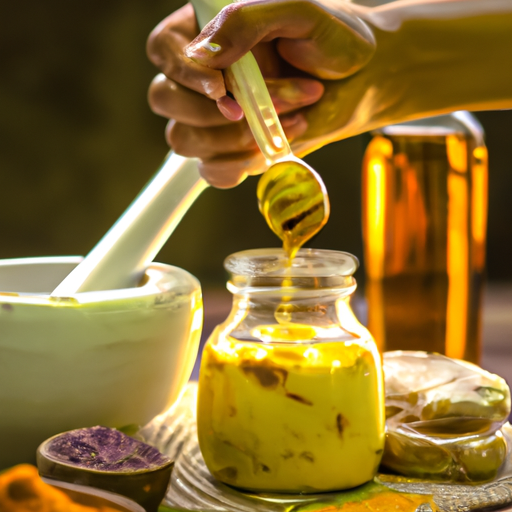Are you and your partner trying to conceive? If so, you may be wondering if certain herbal remedies, such as ginger and turmeric, can affect your fertility. Well, I’m here to provide you with evidence-based information on this topic. So, let’s dive in!
Picture this: you’re sipping on a warm cup of ginger and turmeric tea, while contemplating the potential impact it may have on your chances of getting pregnant. It’s a common question, and one that deserves careful consideration.
In this article, we will explore the health benefits of ginger and turmeric, and delve into their effects on fertility. We’ll also discuss the importance of consulting with a healthcare professional, as well as the need for moderation when consuming these herbs.
Additionally, we’ll touch on other factors that can influence fertility, and explore alternative herbal remedies that may aid in conception. By the end of this article, you’ll have a comprehensive understanding of whether drinking ginger and turmeric is a suitable choice for you and your partner on your journey to parenthood.
Let’s get started!
Key Takeaways
- Ginger and turmeric have potential therapeutic properties that can support fertility and hormonal balance.
- Incorporating ginger and turmeric into a fertility journey can provide additional support, thanks to their anti-inflammatory and digestive properties, as well as their ability to regulate menstrual cycles and reduce menstrual pain.
- However, excessive intake of ginger and turmeric may have adverse effects on fertility and hormonal balance, so it is important to consult with a healthcare professional before using herbal remedies.
- It is also crucial to note that herbal remedies should not replace medical advice or treatments, and a well-rounded approach to conception should include expert advice and lifestyle changes.
The Health Benefits of Ginger and Turmeric
If you’re trying to conceive, you might want to consider incorporating ginger and turmeric into your diet due to their numerous health benefits. These two spices have been used for centuries in traditional medicine and have gained popularity for their potential therapeutic properties.
Ginger is known for its anti-inflammatory and digestive properties, while turmeric contains a compound called curcumin, which has antioxidant and anti-inflammatory effects. Including ginger and turmeric in your daily routine can be as simple as adding them to your meals or incorporating them into your favorite recipes.
There are plenty of turmeric and ginger recipes available that can help you enjoy the benefits of these spices while trying to conceive. Understanding the effects of ginger and turmeric on fertility is essential for anyone considering their use.
Understanding the Effects of Ginger and Turmeric on Fertility
Discover the incredible impact that incorporating ginger and turmeric into your diet can have on your fertility journey. Both ginger and turmeric have been used for centuries in traditional medicine for their various health benefits. When it comes to fertility, these spices can potentially have positive effects on the menstrual cycle. Ginger has been shown to help regulate menstrual cycles and reduce menstrual pain, while turmeric has anti-inflammatory properties that may support a healthy reproductive system.
However, it’s important to note that there are potential risks and side effects associated with consuming ginger and turmeric, especially in large amounts or if you have certain medical conditions. It is always best to consult with a healthcare professional before making any major changes to your diet or incorporating new supplements.
Transitioning into the next section, seeking guidance from a healthcare professional can provide personalized advice and ensure the best approach for your individual fertility journey.
Consult with a Healthcare Professional
To maximize your fertility journey, it’s essential to consult with a healthcare professional for personalized guidance and support.
When it comes to consuming ginger and turmeric while trying to conceive, it’s important to be aware of potential risks. While both ginger and turmeric have been used for centuries for their health benefits, high doses or prolonged use of these herbs may have adverse effects on fertility and pregnancy. Therefore, it is crucial to follow the recommended dosage of ginger and turmeric as advised by your healthcare provider. They can provide you with the appropriate guidance based on your individual circumstances.
Moderation is key when incorporating ginger and turmeric into your diet, as excessive consumption may have unintended consequences.
Transitioning into the next section, it’s important to understand the importance of balance and moderation in your fertility journey.
Moderation is Key
Finding a balance and practicing moderation is crucial in incorporating ginger and turmeric into your diet during your fertility journey. When consuming these spices, it’s important to keep in mind the potential risks and side effects. Here are three key considerations to bear in mind:
-
Dosage: It’s recommended to consume ginger and turmeric in moderation. Excessive intake may have adverse effects on fertility and hormonal balance.
-
Allergies: Some individuals may have allergies to ginger or turmeric. If you experience any allergic reactions, such as hives or difficulty breathing, discontinue use immediately and consult with a healthcare professional.
-
Interactions: Ginger and turmeric may interact with certain medications, including blood thinners and diabetes medications. It’s crucial to consult with your healthcare provider to ensure there are no potential drug interactions.
When trying to conceive, it’s essential to consider other factors affecting fertility.
Consider Other Factors Affecting Fertility
Take a moment to reflect on the various factors that can impact your fertility journey and remember that there is so much more to consider beyond just incorporating ginger and turmeric into your diet. Lifestyle changes play a significant role in fertility, and it’s crucial to address any factors that may be affecting your ability to conceive. Stress, for example, can have a profound impact on fertility. High levels of stress can disrupt hormonal balance and interfere with the menstrual cycle. It’s important to find healthy ways to manage stress, such as exercise, meditation, or therapy. Additionally, maintaining a healthy weight, avoiding smoking and excessive alcohol consumption, and managing chronic health conditions can also improve fertility. Considering these factors alongside incorporating ginger and turmeric can optimize your chances of conceiving. Moving on to alternative herbal remedies for fertility…
Alternative Herbal Remedies for Fertility
Incorporating alternative herbal remedies into your fertility journey can provide additional support and enhance your chances of conceiving. Natural supplements for fertility have gained popularity in recent years, with many individuals turning to herbal remedies for boosting fertility.
Ginger and turmeric, in particular, have been touted for their potential benefits in improving reproductive health. Ginger is believed to have anti-inflammatory properties and may help regulate menstrual cycles. Turmeric, on the other hand, is known for its antioxidant and anti-inflammatory effects, which can support overall reproductive health.
While these herbs are generally considered safe, it’s important to consult with a healthcare professional before incorporating them into your fertility regimen. They can provide guidance on the appropriate dosage and potential interactions with other medications or conditions. Furthermore, it’s crucial to remember that herbal remedies shouldn’t replace medical advice or treatments.
Moving forward, let’s explore the conclusion and final thoughts on this topic.
Conclusion and Final Thoughts
While it may be tempting to believe that herbal remedies hold the key to fertility success, it’s important to remember that there are no magical solutions and consulting with a healthcare professional is crucial for personalized advice. When it comes to trying to conceive, self-care plays a vital role in optimizing fertility. Taking care of oneself physically, mentally, and emotionally can help create the optimal conditions for conception. Additionally, it is important to debunk common fertility myths that can lead to unnecessary stress and anxiety. By understanding the facts and seeking guidance from healthcare professionals, individuals can make informed decisions about their fertility journey. Remember, there is no one-size-fits-all approach, and what works for one person may not work for another. Prioritizing self-care and seeking expert advice will ensure a well-rounded approach to conception.
Table:
| Myths about Fertility | Facts |
|---|---|
| Myth 1: Stress causes infertility | Fact 1: While stress can affect fertility, it is not the sole cause |
| Myth 2: Eating certain foods can boost fertility | Fact 2: A balanced diet is important, but no specific food guarantees fertility |
| Myth 3: Having sex every day increases chances of conception | Fact 3: Timing intercourse with ovulation is more important |
| Myth 4: Fertility declines only with age | Fact 4: Fertility can be affected by various factors at any age |
| Myth 5: Herbal remedies guarantee fertility success | Fact 5: There is no scientific evidence to support this claim |
Frequently Asked Questions
Are there any potential side effects of consuming ginger and turmeric while trying to conceive?
There may be potential risks and safety concerns associated with consuming ginger and turmeric while trying to conceive. It is important to consult with a healthcare professional for personalized advice on this matter.
Can ginger and turmeric help improve sperm quality and male fertility?
Ginger and turmeric are natural remedies for male infertility. They contain antioxidants that can improve sperm quality and fertility. Studies suggest their potential role in enhancing reproductive health.
How much ginger and turmeric should be consumed daily to maximize their potential benefits for fertility?
To maximize the potential benefits of ginger and turmeric for fertility, it is recommended to incorporate them into a preconception diet. Ginger and turmeric recipes for fertility can include adding them to smoothies or using them in cooking.
Are there any specific precautions or guidelines to follow when taking ginger and turmeric supplements while trying to conceive?
When incorporating ginger and turmeric into a fertility-friendly diet, it is important to follow specific guidelines. These supplements can benefit overall reproductive health, but it is recommended to consult with a healthcare professional before taking them while trying to conceive.
Can ginger and turmeric interact with certain medications commonly used for fertility treatments?
Ginger and turmeric have fertility benefits, but they may interact with medications used for fertility treatments. It’s important to consult with a healthcare professional to ensure safe and effective use.
Conclusion
In conclusion, incorporating ginger and turmeric into your diet while trying to conceive can be a beneficial choice. These spices have been shown to have various health benefits and may potentially support fertility. However, it’s important to consult with a healthcare professional to ensure it’s safe for your individual circumstances. Moderation is key, as with any herbal remedy.
Interestingly, a study found that women who consumed ginger regularly had a 17% higher chance of conceiving compared to those who didn’t. Consider these factors and explore other natural remedies to enhance your fertility journey.










